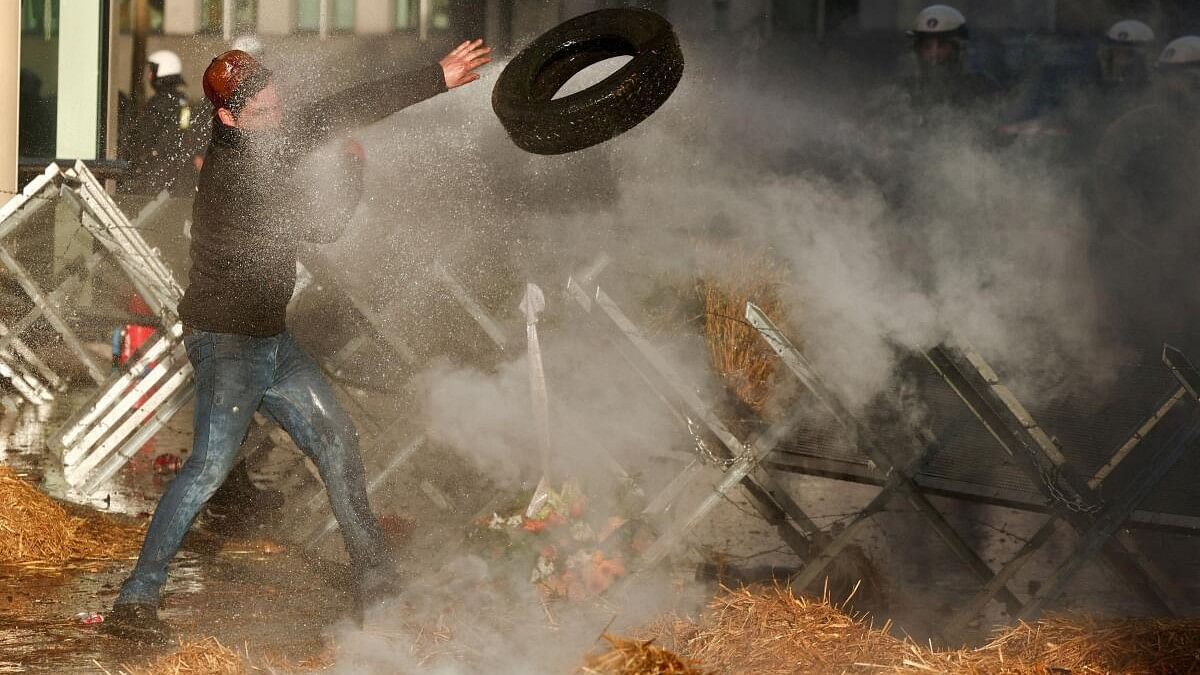
A demonstrator throws a tyre over a barricade next to police officers in riot gear during a protest by farmers from Belgium and other European countries near the European Parliament on the day of an EU summit in Brussels, Belgium.
Credit: Reuters Photo
Farmers' protests have mounted across the European Union to press leaders to do more to help them with taxes and rising costs, among other grievances including over cheap imports and bureaucracy.
Here are some of the issues that have prompted the protest movement across the bloc and in individual countries.
WHY ARE FARMERS PROTESTING?
In most countries, farmers say they are not paid enough, are choked by taxes, red tape and excessive environmental rules and blame cheap food imports.
WHY ARE IMPORTS A PROBLEM?
Large amounts of imports from Ukraine, for which the EU has waived quotas and duties since Russia's invasion, and renewed negotiations to conclude a trade deal between the EU and South American bloc Mercosur have fanned discontent about unfair competition in sugar, grain and meat.
The farmers resent the imports because they say they put pressure European prices while not meeting environmental standards imposed on EU farmers. The European Commission on Wednesday proposed to limit agricultural imports from Ukraine by introducing an "emergency brake" for the most sensitive products - poultry, eggs and sugar - but producers say the volume would still be too high.
WHY IS FALLOW LAND AN ISSUE?
Farmers also take issue with new EU subsidy rules, such as a requirement to leave 4% of farmland fallow.
They denounce excessive bureaucracy, which French farmers say their government compounds by over-complicating implementation. The Commission this week responded by exempting EU farmers for 2024 from the requirement to keep some of their land fallow - not using it for a period of time - while still receiving EU farm support payments, but they would need to instead grow crops without applying pesticides.
IMPACT OF DIESEL FUEL COST
In Germany and France, the EU's biggest agricultural producers, farmers have railed against plans to end subsidies or tax breaks on agricultural diesel. Greek farmers want a tax on diesel to be reduced.
Paris and Berlin have both relented to the pressure and rowed back on their plans.
Here is a breakdown of factors prompting protests country by country:
FRANCE
- Onerous EU red tape
- Diesel prices - More support to shore up incomes. They say a government drive to bring down food inflation has left many producers unable to cover high costs for energy, fertiliser and transport. - Access to irrigation
- Criticism over animal welfare and use of pesticides
BELGIUM
- EU requirement to leave 4% of land fallow
- Cheap imports
- Subsidies favouring larger farms
POLAND
- Cheap imports from Ukraine
- EU regulation
SPAIN
- "Suffocating bureaucracy" drawn up in Brussels that erode the profitability of crops
- Trade deals that open the doors to cheap imports
PORTUGAL
- Insufficient state aid, subsidy cuts - Heavy red tape
- The caretaker government has announced an emergency aid package worth 500 million euros, including 200 million euros to mitigate the impact of a long-running drought
ROMANIA
- Protests in mid-January were mainly against the high cost of diesel
- Expensive insurance rates
- EU environmental regulations
- Cheap imports from Ukraine
- The government has acted to increase diesel subsidies, address insurance rates and expedite subsidy payments
GREECE
- Demands for higher subsidies and faster compensation for crop damage and livestock lost in 2023 floods - Diesel tax and surging electricity bills
- Falling state and EU subsidies.